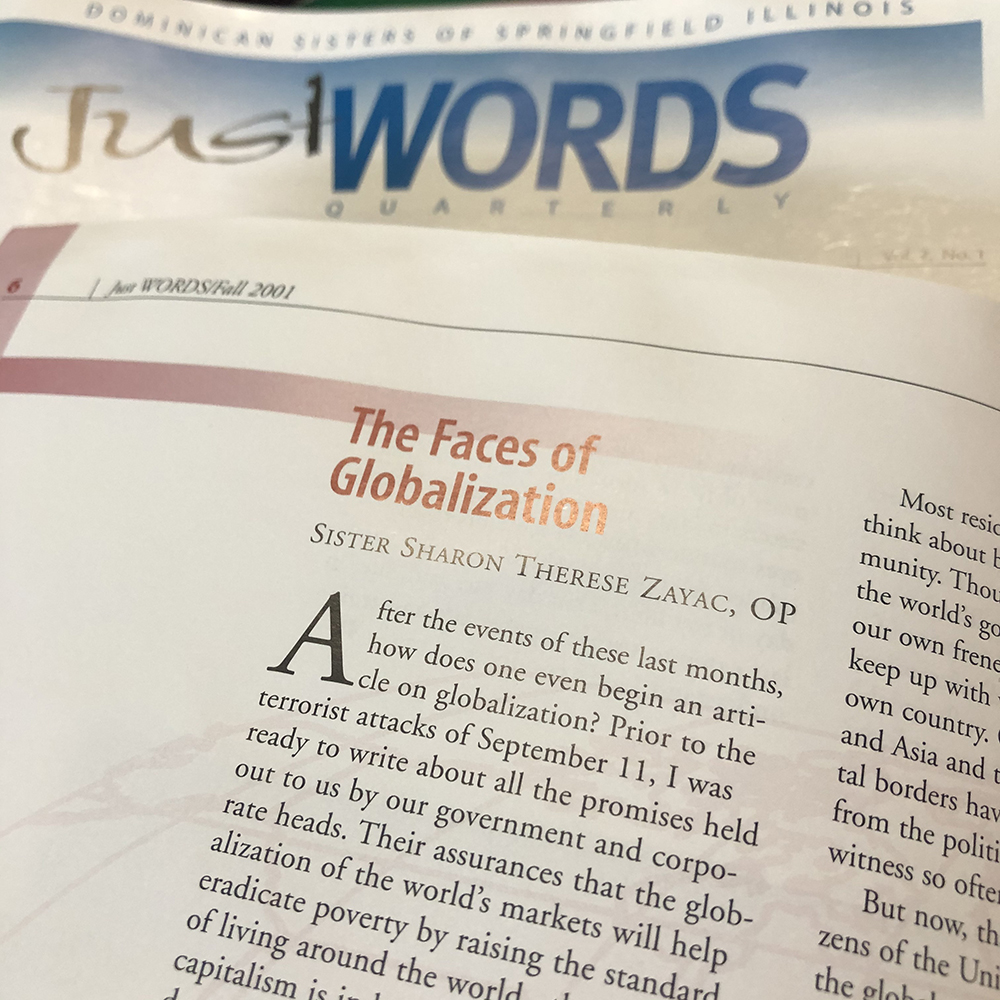
After the events of these last months, how does one even begin an article on globalization? Prior to the terrorist attacks of September 11, I was ready to write about all the promises held out to us by our government and corporate heads. Their assurances that the globalization of the world’s markets will help eradicate poverty by raising the standard of living around the world…that global capitalism is indeed a global victory for democracy…that instant communication will help erase the tyranny of secrecy and isolation that keeps whole peoples bound to their despotic governments.
The adventure of globalization?
I was ready to write that citizens of many countries (as well as a growing number of US citizens) don’t regard globalization as the exciting adventure of the new millennium. They experience first hand the loss of a once-steady job because their company has moved somewhere that provides even cheaper labor and fewer restrictions. They sell themselves or their children into sweatshops or the burgeoning sex trade to make a few cents a day. They watch foreign (often American) corporations turn their water, their soil, and their air into toxic waste. They have no choice but to devastate their own mountains and fisheries and forests in order to pay off the debts that burn their governments. And they, in overwhelming numbers, have no access to clean water, transportation, or electricity, let alone the unheard of luxury of instant communication.
I was ready to share how many people around the world lay the blame for this assault on their economies and cultures right at the feet of the American government and, by association, at the feet of all of us. As leaders of the “free” world, we make the largest and most recognizable target. It is our television programs and movies they see. It is our jeans and t-shirts and shoes they desire. It is our soda they drink and our hamburgers they eat.
Most residents of the United States don’t think about being part of the global community. Though we often enjoy much of the world’s goods, we are so caught up in our own frenetic lives that we do well to keep up with what’s happening around our own country. Our distance from Europe and Asia and the vastness of our continental borders have kept us fairly immune from the political unrest and violence we witness so often in network news.
But now, that has all changed. We citizens of the United States have finally joined the global community. The bombings, the threat of further attack, the fear and anxious concern for loved ones are no longer things we see on television happening in a country a long way from us. they are here, on our own shores, in our own cities. More than any trade agreement, more than the proliferation and popularity of ethnic restaurants, more than any importing of exotic foods and goods, these horrifying and devastating attacks have truly made us one with the rest of the world.
The face of compassion
We have tremendous challenge before us. Even as our government leaders are preparing us for more violence and more loss of innocent lives, we have an unprecedented opportunity. We can add one more face to globalization: the face of compassion. A compassion born of meeting, working, living with our sisters and brothers around the world. A compassion upheld by the firm conviction that peoples are not their government, nor their fanatic fundamentalist sects, nor the images portrayed by biased and self-seeking groups.
Springfield Dominican sisters have journeyed to Zambia and Iraq and witnessed the spirit of the Dominican sisters there. We have convened with the Dominican Family in the Philippines and lived with our sisters in Slovakia. We labor with our Peruvian brothers and sisters, and with our Hispanic brothers and sisters here in Illinois, Kentucky, and Arkansas. And we stand with our Central and South American family as we continue to protest the School of the Americas (no matter what new name they have given it). Their many stories have become ours; our story is one with theirs.
President Bush has vowed to put an end to terrorism. There can be no end to the political and economic systems that oppress the people and the planet if the means we use to eradicate those systems are the same ones used to keep them in place. Our Direction Statement and the ordinations from this last General Chapter plant us firmly in the struggle for liberation. May they become the flag we hold high. May they be the chant that carries us forth.
Written by Sister Sharon Zayac, OP, and first published in JUST Words, Vol. 1, No.1.

